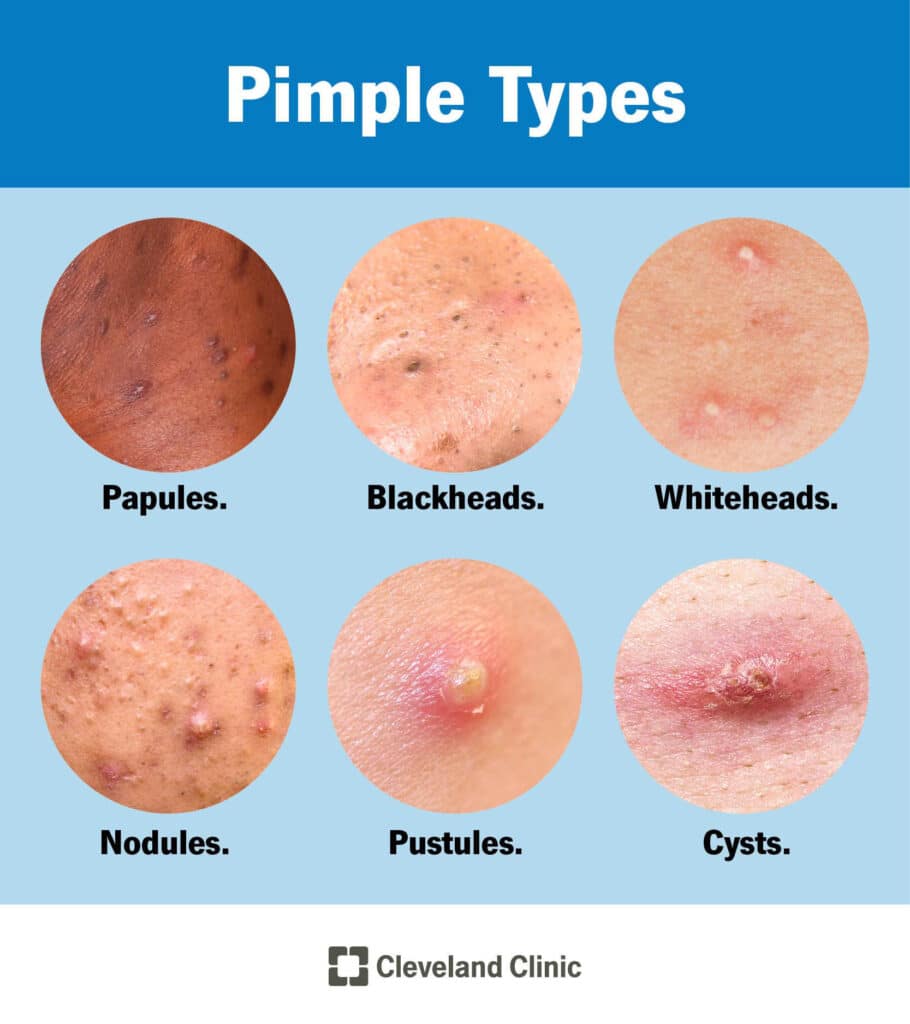
Skin Deep: Understanding Acne

What Causes Acne in Adolescence?
The primary culprit for acne is the fluctuation of hormones, particularly during puberty. These hormonal changes stimulate the skin’s oil glands, leading to excess oil production, which clogs pores and creates the perfect inflamed environment for acne-causing bacteria.

Types of Acne
- Whiteheads: Closed clogged pores.
- Blackheads: Open clogged pores.
- Papules: Small red bumps.
- Pustules: Pus-filled pimples.
- Nodules: Large, painful lumps beneath the skin.
- Cysts: Painful, pus-filled lumps under the skin
The difference between acne versus pimples is that acne is a chronic disease of the skin and oil glands, while pimples are individual lesions. Pimples can be healed with spot treatments in the moment—acne requires a lot more work to manage!
Tips for Managing Acne
- Proper Cleansing: Use a mild cleanser twice a day.
- Avoid Exfoliating: Excessive scrubbing and exfoliation can irritate the skin.
- Oil-Free Products: Choose cosmetics and creams that are non-comedogenic.
- No Picking: Resist the urge to pop or pick at pimples.
Over-the-Counter Treatments
- Adapalene – this is a vitamin A derivative called a retinoid that comes in gel or cream form and needs to be used regularly for acne improvement
- Benzoyl Peroxide – a topical antimicrobial agent found in cleansers, creams, and gels that helps clear surface blemishes by targeting pimple-causing bacteria
- Salicylic Acid – another topical agent found in cleansers and creams that helps break down the materials clogging pores
- Hydrocolloid Patches – these viral “Pimple Patches” are actually wound dressings that have long been used by physicians and surgeons to help promote skin healing and prevent scar formation; they won’t cure your acne but they will help that pesky pimple clear up
General Tips for Healthy Skin
A good foundation of healthy skin is key to managing acne and preventing pimples and breakouts! There are a few good habits everyone should get into, including:
- Sun Protection: Sunscreen and other sun protection, such as hats, help defend the skin against damage that can lead to worse inflammation and more breakouts.
- Be Gentle: Avoid frequent exfoliation, astringent toners, and any alcohol-containing skin products, as these can dry out your skin and cause microscopic damage.
- Wash Your Face: Be sure to remove all makeup products before bed and to wash sweat and grime off your face after any activity to help prevent blocked pores and dead skin build-up.
- Moisturize Regularly: Even for those with oily skin! Moisturizers help keep the skin barrier firm and ready to ward off pimple-causing bacteria.
- No Sharing: Do not share makeup tools, as this can cause the transfer of bacteria from one face to another. We all have our own healthy bacteria, but that doesn’t mean they’re also good for your friends.
Here at Tribeca AYAM, we offer personalized acne treatment plans to get your skin back on track. Our physicians are committed to providing holistic and evidence-based approaches to manage breakouts. If you’re struggling with your skin, don’t hesitate to schedule with us and get a treatment plan going.
Best wishes for a happy, healthy summer ahead!
The Tribeca AYAM Team
